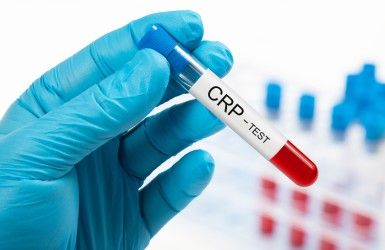Orthopedic Conditions
Do You Have Constant Joint Pain or Swelling? This Test Can Help Understand the Reason
6 min read
By Apollo 24|7, Published on - 26 May 2025
Share this article
0
0 like

Do You Have Constant Joint Pain or Swelling? This Test Can Help Understand the Reason
Joint pain and swelling can have a profound impact on your daily life, making simple tasks like walking or climbing stairs feel difficult. Whether the pain is due to an injury, age-related wear and tear, or an underlying health condition, identifying the root cause is essential for effective treatment. One of the most valuable tools for diagnosing the cause of joint pain and inflammation is the C-reactive protein (CRP) test. This simple blood test can reveal if your body is experiencing inflammation and provide crucial insights into your health. This article will explore the CRP test, its importance in diagnosing joint pain, and how it can guide your treatment.
What Is the CRP Test?
The C-reactive protein (CRP) test measures levels of this protein in the blood, helping doctors determine the degree of inflammation and potential underlying conditions. While CRP does not diagnose a specific disease on its own, elevated levels serve as an important warning sign that further investigation is needed.
1. How CRP Relates to Joint Pain and Swelling
Inflammation is one of the primary drivers of joint pain and swelling. It occurs when the body's immune system reacts to injury, infection, or disease. If inflammation becomes excessive or chronic, it can lead to joint damage and persistent discomfort.
2. Conditions That Cause Joint Pain and Elevated CRP Levels
Inflammation is a primary cause of joint pain. The CRP test helps doctors assess the degree of inflammation and can point to conditions that might be contributing to your symptoms, such as:
- Rheumatoid arthritis (RA): An autoimmune disease where the body attacks its own joints, leading to swelling, pain, and stiffness.
- Osteoarthritis (OA): The most common type of arthritis, typically caused by the wear and tear of joint cartilage.
- Infections: Joint infections caused by bacteria, viruses, or fungi can trigger inflammation and elevated CRP levels.
- Lupus: An autoimmune disease that affects multiple systems in the body, including the joints, causing pain and swelling.
By measuring CRP levels, doctors can better understand the severity of inflammation in the body, which helps them towards diagnoses and choosing the best treatment plan.
When Should You Consider a CRP Test?
Your doctor may recommend a C-reactive protein (CRP) test if you experience persistent joint pain, swelling, or signs of systemic inflammation. This test helps determine if underlying inflammation is contributing to your symptoms. Consider taking a CRP test if you have:
- Chronic joint pain or swelling that does not improve with standard pain relief or anti-inflammatory medications.
- Morning stiffness lasting longer than 30 minutes, which is commonly associated with autoimmune conditions like rheumatoid arthritis (RA).
- Fatigue and fever that occur alongside joint discomfort, possibly indicating infection, autoimmune disease, or systemic inflammation.
- Redness or warmth around affected joints, suggesting active inflammation that may require medical evaluation.
Additionally, CRP testing may be helpful if you:
- Have a family history of autoimmune diseases like RA, lupus, or inflammatory arthritis.
- Experience unexplained symptoms, such as skin rashes, difficulty moving, or unintentional weight loss, which could indicate an underlying inflammatory disorder.
How to Prepare for a CRP Blood Test
Preparing for a C-reactive protein (CRP) blood test is simple, as it generally does not require special precautions. However, here are a few things to keep in mind:
Fasting: Usually, fasting is not required for a standard CRP test. However, if your doctor has ordered a high-sensitivity CRP (hs-CRP) test to assess heart disease risk, fasting for 8 to 12 hours may be necessary.
- Medications: Inform your doctor about any medications, as certain drugs (such as anti-inflammatory medicines) may affect CRP levels.
- Lifestyle Factors: Avoid intense exercise, alcohol, and smoking before the test, as they can temporarily influence inflammation markers.
- Hydration & Comfort: Drink water and wear a short-sleeved shirt to make the blood draw more convenient.
What to Expect During the CRP Test Procedure?
The CRP test is a quick and straightforward blood test that usually takes only a few minutes:
- Blood Sample Collection: A healthcare provider will clean the skin and insert a needle into a vein (typically in the arm) to draw a small blood sample.
- Lab Analysis: The sample is sent to a laboratory, where CRP levels are measured to detect inflammation.
- Minimal Discomfort: You may feel a slight pinch during the needle insertion, but the pain is minimal and short-lived.
- Results: Test results are generally available within 24 to 48 hours, and your doctor will interpret them based on your symptoms and medical history.
Understanding CRP Test Results
CRP test results are typically reported in milligrams per litre (mg/L) of blood. Here's how CRP levels are generally interpreted:
Doctors use these values in context with symptoms, medical history, and additional tests to determine whether inflammation is temporary (due to infection or injury) or chronic (linked to conditions like rheumatoid arthritis, lupus, or cardiovascular diseases).
- Factors That Can Influence Your CRP Results
- Several factors can temporarily raise or lower CRP levels, including:
- Recent infections or injuries (which spike CRP temporarily)
- Chronic stress and poor lifestyle habits (which may contribute to low-grade inflammation)
- Smoking, obesity, and high cholesterol (which may result in slightly elevated CRP)
- Certain medications, such as anti-inflammatory drugs, can lower CRP levels
Have more questions?
Managing Elevated CRP Levels
If your CRP levels are high, addressing the underlying cause of inflammation is crucial. Treatment options may include:
- Anti-inflammatory medications: Nonsteroidal anti-inflammatory drugs (NSAIDs) like ibuprofen can reduce pain and swelling.
- Disease-modifying medications: For autoimmune conditions like rheumatoid arthritis, medications such as methotrexate or biologics can help control inflammation and prevent joint damage.
- Lifestyle changes: Incorporating an anti-inflammatory diet, regular low-impact exercise, and stress management techniques can help control inflammation.
- Physical therapy: Helps improve joint mobility and manage pain associated with chronic inflammation.
Conclusion
If you’re experiencing joint pain, swelling, or stiffness, the CRP test can be a vital tool in uncovering the cause. Early detection of inflammation allows for timely intervention, preventing further joint damage and improving your quality of life. If you identify with any of the symptoms mentioned, speak with your doctor about getting a CRP test. Taking proactive steps towards diagnosis and treatment can help you regain mobility and live without constant discomfort.
Book CRP Test
Orthopedic Conditions
Consult Top Orthopaedicians
View AllFrequently Asked Questions
What does CRP test means?
What does CRP test means?
How does a C reactive protein test help with joint pain diagnosis?
How does a C reactive protein test help with joint pain diagnosis?
What is the CRP normal range?
What is the CRP normal range?
Can the CRP test detect specific conditions like rheumatoid arthritis or osteoarthritis?
Can the CRP test detect specific conditions like rheumatoid arthritis or osteoarthritis?
Can diet affect my C reactive protein test levels?
Can diet affect my C reactive protein test levels?
Leave Comment
Recommended for you

Orthopedic Conditions
Is Carpal Tunnel Syndrome Making Your Hand Painful and Numb?
Carpal tunnel syndrome (CTS) is a common progressive nerve condition that affects the hand and wrist.

Orthopedic Conditions
What Happens If You Keep Cracking Your Knuckles Too Much?
While you might crack your knuckles when you're anxious, your hand might start to feel the effects of all that knuckle-cracking. How? This blog covers everything you need to know about knuckle cracking.

Orthopedic Conditions
Try These Yoga Asanas To Strengthen Your Back
For people of all ages, yoga has positive effects on both physical and mental health. Yoga can also become a crucial component of your treatment and possibly speed up recovery if you're battling an illness, recuperating from surgery, or dealing with a chronic disease.
Subscribe
Sign up for our free Health Library Daily Newsletter
Get doctor-approved health tips, news, and more.
Visual Stories

Natural Ways to Get Relief from Arthritis
Tap to continue exploring
Recommended for you

Orthopedic Conditions
Is Carpal Tunnel Syndrome Making Your Hand Painful and Numb?
Carpal tunnel syndrome (CTS) is a common progressive nerve condition that affects the hand and wrist.

Orthopedic Conditions
What Happens If You Keep Cracking Your Knuckles Too Much?
While you might crack your knuckles when you're anxious, your hand might start to feel the effects of all that knuckle-cracking. How? This blog covers everything you need to know about knuckle cracking.

Orthopedic Conditions
Try These Yoga Asanas To Strengthen Your Back
For people of all ages, yoga has positive effects on both physical and mental health. Yoga can also become a crucial component of your treatment and possibly speed up recovery if you're battling an illness, recuperating from surgery, or dealing with a chronic disease.



